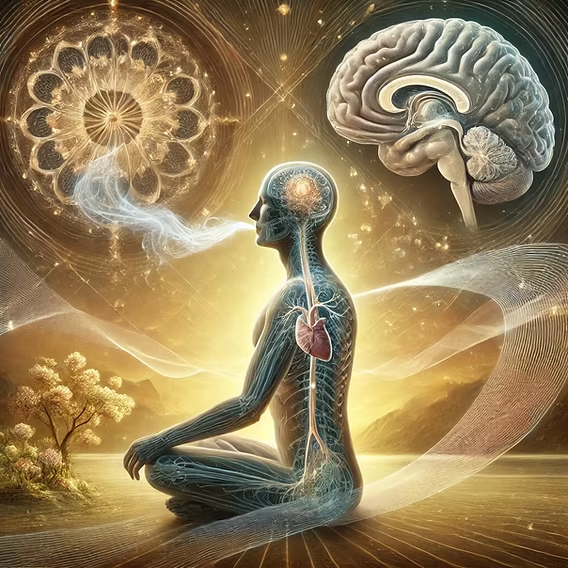
Introduction
In a Science of breathing, a fast-paced world where anxiety and stress dominate everyday life, people are searching for effective, drug-free solutions to achieve peace and emotional stability. Surprisingly, one of the most potent tools for calming the mind and body is something we do around 20,000 times a day: breathing. Recent research and ancient practices alike point to the incredible power of breathing techniques to improve mental health, especially in cases of severe anxiety.
This article explores the science behind breathwork, real-life stories of transformation, and how specific breathing techniques like SKY Breath Meditation are revolutionizing the field of mental wellness.
The Power of Breathing in High-Stress Situations
Imagine being in a life-or-death situation and remaining calm enough to make rational decisions. That’s exactly what happened to Jake, a U.S. Marine Corps officer. While on duty in Afghanistan, Jake’s vehicle hit a roadside bomb. Though severely injured, he was able to stabilize himself and help others, thanks to a simple but powerful breathing technique.
Doctors later confirmed that his quick thinking and controlled breathing saved his life. Jake’s story serves as a potent reminder of how critical breath control can be, even in the most dire circumstances.
The Biology of Breathing
Understanding why breathing is so effective requires a look at human physiology. Breathing is one of the few bodily functions that can be both voluntary and involuntary, offering a direct channel to influence the nervous system.
- Calms the Nervous System: Controlled breathing stimulates the parasympathetic nervous system, helping reduce heart rate and promote relaxation.
- Affects Brain Activity: Studies show that breathing rhythms impact areas of the brain involved in emotions, attention, and memory.
- Lowers Cortisol Levels: Deep breathing helps lower cortisol, the primary stress hormone, thereby reducing anxiety symptoms.
Beyond Cognitive Interventions: Why Breathing Works Better
Modern psychology often leans heavily on cognitive interventions like therapy and mindfulness. While effective, these techniques sometimes fall short during emotional crises. Under extreme stress, rational thinking declines as the prefrontal cortex becomes less active, and the amygdala takes over, making it difficult to calm down using thought alone.
Breathing bypasses this limitation by acting directly on the body. According to Stanford neuroscientist Andrew Huberman, changing your breathing pattern can impact your mood faster than simply observing your breath.
Scientific Studies Supporting Breathwork
Several research studies now validate the effectiveness of breathing techniques for improving mental health:
- UCLA Study on At-Risk Youth
- Method: SKY Breath Meditation
- Results: Reduced impulsivity, a risk factor for substance abuse and psychiatric disorders.
- Yale University Study
- Compared traditional interventions like mindfulness and emotional intelligence with SKY.
- Result: SKY showed superior improvements in mental health and stress management.
- Harvard and University of Arizona Study
- SKY participants showed less stress response than those in cognitive stress management programs.
- The effects lasted three months, showing long-term benefits.
Backlink Reference: Art of Living SKY Research
Personal Transformation: From Anxiety to Empowerment
One remarkable case involves a Yale undergraduate who struggled with severe depression and anxiety due to familial and academic pressures. Traditional methods failed, and he had attempted suicide multiple times. After undergoing SKY Breath Meditation, he stabilized, regained control, graduated with honors, and entered a prestigious graduate program.
Such transformations highlight the potential of breathwork as a life-changing tool, especially for those with treatment-resistant mental health issues.
Breathwork vs PTSD: A Clinical Breakthrough
In collaboration with the Palo Alto Veterans’ Hospital and Project Welcome Home Troops, researchers studied the effects of SKY Breath Meditation on veterans with PTSD. Findings showed:
- Results equal to cognitive processing therapy (the gold standard).
- Superior emotional regulation.
- Benefits lasting a year post-intervention.
Reference: Project Welcome Home Troops
How Breathing Changes Brain Function
Breathing deeply impacts neural functions in the following ways:
- Heart Rate Variability (HRV) improves, indicating better emotional regulation.
- Enhanced Prefrontal Cortex Activity helps in decision-making and impulse control.
- Amygdala Deactivation reduces fear and anxiety responses.
A simple exercise: Try inhaling for four seconds, holding for four, and exhaling for six seconds. Repeat for five minutes. You’ll likely notice a calmness sweeping over you.
SKY Breath Meditation: The Gold Standard
SKY Breath Meditation stands out among various breathing techniques due to its structured, evidence-based approach:
- Time Required: Just 20 minutes daily
- Tools Needed: None
- Training: Available through the Art of Living Foundation
- Reported Benefits: Reduced anxiety, increased focus, emotional resilience, improved sleep, and enhanced overall well-being.
Reference: SKY Breath Meditation
Ancient Roots, Modern Science
Breathwork has been practiced for thousands of years in India and other ancient civilizations. Today, modern neuroscience is beginning to uncover the mechanisms behind its efficacy. This fusion of ancient wisdom and contemporary research is unlocking a new frontier in precision mental health care.
Practical Tips for Everyday Life
- Start Small: Begin with five minutes a day.
- Consistency Matters: Make breathwork a daily habit.
- Use Apps or Join Workshops: Guided breathing sessions can enhance your experience.
- Practice Before Stressful Events: Pre-meeting or pre-exam breathwork can improve performance.
- Integrate with Physical Exercise: Combine yoga or walking with mindful breathing.
Conclusion: Breath Your Way to Better Mental Health
In a world where mental health challenges are escalating, simple, accessible, and effective solutions are more crucial than ever. Breathing techniques, especially structured ones like SKY Breath Meditation, offer a drug-free, scalable, and scientifically validated way to improve mental health and build stress resilience.
Whether you’re facing everyday stress or severe anxiety, learning how to breathe consciously could be the most powerful and transformative tool at your disposal.
Author Bio: This article was written by a mental wellness advocate and researcher specializing in non-pharmacological mental health interventions.
[…] Read More: How Deep Breaths Can Ease Severe Anxiety […]